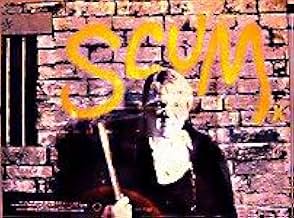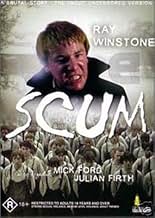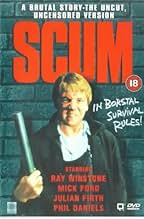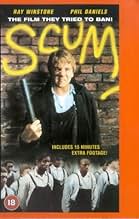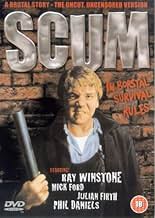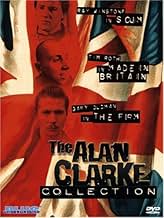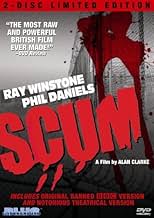IMDb रेटिंग
7.5/10
14 हज़ार
आपकी रेटिंग
अपनी भाषा में प्लॉट जोड़ेंAn uncompromising story of life in a British juvenile offender institution in the '70s.An uncompromising story of life in a British juvenile offender institution in the '70s.An uncompromising story of life in a British juvenile offender institution in the '70s.
Philip DaCosta
- Jackson
- (as Philip Da Costa)
फ़ीचर्ड समीक्षाएं
I have seen this film once, and that should be enough for many people, yet they probably will have an urge to see it again and see the actors who are now making bigger, slicker movies (Cat off Red Dwarf in Blade 2 and Ray Winstone in everything!)
As it is about people around my age, this film hit me even harder. The rape scene counts as being the most sickening scene in movie scene history, yet it is all integral to the story. It is extremely bloody, racist and yet moving and heartbreaking. Ray Winstone is a cruel revelation as a top dog,a sympathetic yet violent hoodlum. Never been better since, I think.
The film moves at a breakneck speed and never seems to sag. I don't know what those employed at a borstal will think of it, but it would probably make them think more of the broken-down urchins as human.
A hard film to like, but even harder to forget. If I was rating it, a 3/5. I think I would give it a five if it wasn't so stomach-churningly realistic. Violence in films can be entertaining, but on no account this time.
As it is about people around my age, this film hit me even harder. The rape scene counts as being the most sickening scene in movie scene history, yet it is all integral to the story. It is extremely bloody, racist and yet moving and heartbreaking. Ray Winstone is a cruel revelation as a top dog,a sympathetic yet violent hoodlum. Never been better since, I think.
The film moves at a breakneck speed and never seems to sag. I don't know what those employed at a borstal will think of it, but it would probably make them think more of the broken-down urchins as human.
A hard film to like, but even harder to forget. If I was rating it, a 3/5. I think I would give it a five if it wasn't so stomach-churningly realistic. Violence in films can be entertaining, but on no account this time.
It is the late 70's and the borstal system is in full effect in England. To one such institution a young man by the name of Carlin is sent. Though ostensibly there for reform and education, the brutality of the place and its inhabitants (wardens and inmates alike) is more conducive of violence than rehabilitation. Facing daily beatings and constant subjugation, Carlin soon realises that he must rise up the pecking order if he wants any kind of respect or security, and that the best way to do that is through thuggery. Whether or not Carlin will conquer the borstal, or be destroyed by the place, remains to be seen in Alan Clarke's uncompromising, unforgettable 'Scum.'
'Scum' is a cutting treatise against borstals and those who ran them, which must have shocked audiences when it was released. It was not until the passing of The Criminal Justice Act of 1982 that borstals were officially shuttered across the UK, so the film was a most contemporary excoriation in 1979. Clarke had actually filmed 'Scum' two years earlier, for the BBC'S Play For Today series. It was deemed too unremitting for television, so it was rewritten, the same cast (largely) were assembled- as well as a new crew- and 'Scum' was reshot and released as the full-length feature discussed here now.
'Scum' is a tough film, one that is immensely affecting and unpredictable. The tale is bleak and harrowing, full of uncomfortable moments of persecution and ferocity. Written by Roy Minton, the story portrays the system of borstal to be a deeply flawed one that does more harm than good, led by brutes and disinterested stooges who believe that mercilessness is a positive attribute. The children have no hope of amelioration when trapped in that vicious, defunct system. The savagery they engage in is a barbaric but understandable, inevitable cry of frustration against the detachment and callousness with which they are treated.
The film is shot by cinematographer Phil Meheux, who has worked on movies ranging in quality and subject matter from 'The Long Good Friday' to 'Beverly Hills Chihuahua.' His work for 'Scum' is strikingly natural and gritty. He captures the starkness of the institution and its grounds with his documentary-style camera work masterfully, reinforcing the aura of cold nastiness which surrounds and envelops the inmates. Mike Porter's unembellished production design must also be mentioned, as it is understated work that is most notable, making the locations look lived-in and true-to-life. Additionally, Michael Bradsell's tight editing keeps the film running smoothly at a fast, even pace; ever building in intensity towards an explosive finale.
The great Ray Winstone stars as Carlin, delivering an intense, towering performance that is captivating and frightening both. One of his first acting roles, he performs with an ease and power unmatched by the rest of the cast, dominating the movie completely. Never once do you feel that Winstone is acting on screen, he inhabits the character of Carlin as if by birth-right. Playing him like a young Richard III and Reggie Kray combined, Winstone showcases seemingly boundless depth, energy and ability; leaving an indelible impression on the viewer.
Winstone's supporting cast don't let him down, each and all delivering strong performances, with a few particularly of note. Mick Ford plays a fellow inmate named Archer, who believes in pacifism, and Julian Firth stars as another, the introverted, ill-fated Davis. Both impress with their emotional range and perspicuity. John Judd and Philip Jackson star as two of the wardens, both playing sadistic egocentrics with real verve and panache. Judd is especially sinister, and his seedy grin will no doubt linger in the mind long after the credits have rolled on 'Scum.'
Uncompromising and unforgettable, Alan Clarke's 'Scum' is a powerful piece of cinema that holds a mirror up to society; reflecting back a cruel, cold and very real vision of life in the borstal system. Featuring strong performances all round- including a commanding central one from Ray Winstone- as well as striking visuals, the film impresses on nearly every level. It is shockingly violent and sadly realistic, making it hard to watch; but also thoroughly impossible to ignore.
'Scum' is a cutting treatise against borstals and those who ran them, which must have shocked audiences when it was released. It was not until the passing of The Criminal Justice Act of 1982 that borstals were officially shuttered across the UK, so the film was a most contemporary excoriation in 1979. Clarke had actually filmed 'Scum' two years earlier, for the BBC'S Play For Today series. It was deemed too unremitting for television, so it was rewritten, the same cast (largely) were assembled- as well as a new crew- and 'Scum' was reshot and released as the full-length feature discussed here now.
'Scum' is a tough film, one that is immensely affecting and unpredictable. The tale is bleak and harrowing, full of uncomfortable moments of persecution and ferocity. Written by Roy Minton, the story portrays the system of borstal to be a deeply flawed one that does more harm than good, led by brutes and disinterested stooges who believe that mercilessness is a positive attribute. The children have no hope of amelioration when trapped in that vicious, defunct system. The savagery they engage in is a barbaric but understandable, inevitable cry of frustration against the detachment and callousness with which they are treated.
The film is shot by cinematographer Phil Meheux, who has worked on movies ranging in quality and subject matter from 'The Long Good Friday' to 'Beverly Hills Chihuahua.' His work for 'Scum' is strikingly natural and gritty. He captures the starkness of the institution and its grounds with his documentary-style camera work masterfully, reinforcing the aura of cold nastiness which surrounds and envelops the inmates. Mike Porter's unembellished production design must also be mentioned, as it is understated work that is most notable, making the locations look lived-in and true-to-life. Additionally, Michael Bradsell's tight editing keeps the film running smoothly at a fast, even pace; ever building in intensity towards an explosive finale.
The great Ray Winstone stars as Carlin, delivering an intense, towering performance that is captivating and frightening both. One of his first acting roles, he performs with an ease and power unmatched by the rest of the cast, dominating the movie completely. Never once do you feel that Winstone is acting on screen, he inhabits the character of Carlin as if by birth-right. Playing him like a young Richard III and Reggie Kray combined, Winstone showcases seemingly boundless depth, energy and ability; leaving an indelible impression on the viewer.
Winstone's supporting cast don't let him down, each and all delivering strong performances, with a few particularly of note. Mick Ford plays a fellow inmate named Archer, who believes in pacifism, and Julian Firth stars as another, the introverted, ill-fated Davis. Both impress with their emotional range and perspicuity. John Judd and Philip Jackson star as two of the wardens, both playing sadistic egocentrics with real verve and panache. Judd is especially sinister, and his seedy grin will no doubt linger in the mind long after the credits have rolled on 'Scum.'
Uncompromising and unforgettable, Alan Clarke's 'Scum' is a powerful piece of cinema that holds a mirror up to society; reflecting back a cruel, cold and very real vision of life in the borstal system. Featuring strong performances all round- including a commanding central one from Ray Winstone- as well as striking visuals, the film impresses on nearly every level. It is shockingly violent and sadly realistic, making it hard to watch; but also thoroughly impossible to ignore.
Be warned that you should go into this film with your guard up. By the time the final scene has faded quietly out, you will probably be in a state of shock.
The film details life in a Borstal institution and the violence and racial hatred that runs rampant through both the prisoners and their wardens. There is nothing cheery here at all and that is precisely the point. Director Alan Clarke deliberately films with a documentary style and it is this realism that makes the film so shattering. Scenes of sexual and racial abuse are placed in front of the camera and no raw nerve is spared the touch of the film.
It should be shown to youngsters as a reason not to turn to crime.
The film details life in a Borstal institution and the violence and racial hatred that runs rampant through both the prisoners and their wardens. There is nothing cheery here at all and that is precisely the point. Director Alan Clarke deliberately films with a documentary style and it is this realism that makes the film so shattering. Scenes of sexual and racial abuse are placed in front of the camera and no raw nerve is spared the touch of the film.
It should be shown to youngsters as a reason not to turn to crime.
Scum (the screenplay) was originally banned in 1977 - the year it was made - on the instructions of the BBC who had commissioned it. This was on the grounds of it being both too realistic in its presentation and simultaneously a work of fiction. The film follows the progression of three boys at borstal (prison for males ages 11-16) from arrival to the social dominance of one of them. It's a blackly humorous and scathing study of the (physical *and* mental) violence inherent in any social system, and particularly in the 'justice' system.
The screenplay was remade as a feature film in 1979, starring most of the original cast and featuring most of the original script, although a couple of scenes (featuring sexual abuse, though physical and racial abuse were deemed acceptable...) were presumably cut from the script because they wouldn't pass even the BBFC censor.
The original screenplay has subsequently been shown on UK television once. I happened to have the video running. With a high-quality tape in it. Lucky, that! It compares very favourably to the film, though the film format appears inferior (lower budget at the BBC), the quality of the performances is possibly better.
Scum is one of the most important screenplays to have been made, and shown, on British television, because it reveals the changing attitudes of the censors, and the nature of political censorship in the UK.
The film itself does not reveal this history.
The screenplay was remade as a feature film in 1979, starring most of the original cast and featuring most of the original script, although a couple of scenes (featuring sexual abuse, though physical and racial abuse were deemed acceptable...) were presumably cut from the script because they wouldn't pass even the BBFC censor.
The original screenplay has subsequently been shown on UK television once. I happened to have the video running. With a high-quality tape in it. Lucky, that! It compares very favourably to the film, though the film format appears inferior (lower budget at the BBC), the quality of the performances is possibly better.
Scum is one of the most important screenplays to have been made, and shown, on British television, because it reveals the changing attitudes of the censors, and the nature of political censorship in the UK.
The film itself does not reveal this history.
I've now seen this movie several times, although admittedly watching it can hardly be classed as a 'pleasure'. Alan Clarke made this feature after his TV play from two years earlier was banned, and perhaps had more freedom here to explore the issues.
Carlin (an early, showy appearance from Ray Winstone) is sent to Borstal where he quickly establishes himself as a tough boy with a regime of strength. Typical Winstone performance in many ways. In the prison with him are his shadow Richards (played by Phil Daniels); cynical, bare-footed Archer (Mick Ford, these days more often seen the other side of the law in such dramas as 'Silent Witness'); black inmate Angel (Davidson Knight); and quiet Davis, the boy who gets picked on for being a loner (a quite staggering performance from Julian Firth, who never really lived up to this early promise).
Scum is uncompromising - violent (there's a rape which leaves little to the imagination, a suicide, several fights); scathing in its condemnation of the 'system' (which thankfully is not like this now) - and yet finds time for character development and convincing plot. Without any music it is purely presented in documentary style, matter-of-fact 'this is how it is'.
Not a fun movie, but one which tries to make a point, and, if nothing else, has the power to shock and make you remember certain sections for a long time after viewing. Recommended.
Carlin (an early, showy appearance from Ray Winstone) is sent to Borstal where he quickly establishes himself as a tough boy with a regime of strength. Typical Winstone performance in many ways. In the prison with him are his shadow Richards (played by Phil Daniels); cynical, bare-footed Archer (Mick Ford, these days more often seen the other side of the law in such dramas as 'Silent Witness'); black inmate Angel (Davidson Knight); and quiet Davis, the boy who gets picked on for being a loner (a quite staggering performance from Julian Firth, who never really lived up to this early promise).
Scum is uncompromising - violent (there's a rape which leaves little to the imagination, a suicide, several fights); scathing in its condemnation of the 'system' (which thankfully is not like this now) - and yet finds time for character development and convincing plot. Without any music it is purely presented in documentary style, matter-of-fact 'this is how it is'.
Not a fun movie, but one which tries to make a point, and, if nothing else, has the power to shock and make you remember certain sections for a long time after viewing. Recommended.
क्या आपको पता है
- ट्रिवियाCarlin was originally a Glaswegian, but was changed into a Cockney when Alan Clarke saw a then-unknown Ray Winstone walk in a unique way.
- गूफ़All borstal inmates were subject to the same mandatory short-back-and-sides haircut, yet a vast array of hairstyles are shown throughout the film, including afros.
- इसके अलावा अन्य वर्जनNorwegian cinema version was cut in the rape scene and the suicide scene. Later video versions are uncut.
- कनेक्शनFeatured in The South Bank Show: Keith Jarrett/Scum (1979)
- साउंडट्रैकDirty Last Night
(uncredited)
Music by John Dickson and Elfed Hayes
De Wolfe Music Ltd
टॉप पसंद
रेटिंग देने के लिए साइन-इन करें और वैयक्तिकृत सुझावों के लिए वॉचलिस्ट करें
- How long is Scum?Alexa द्वारा संचालित
विवरण
- रिलीज़ की तारीख़
- कंट्री ऑफ़ ओरिजिन
- आधिकारिक साइट
- भाषा
- इस रूप में भी जाना जाता है
- Scum más allá de la degradación
- फ़िल्माने की जगहें
- उत्पादन कंपनियां
- IMDbPro पर और कंपनी क्रेडिट देखें
बॉक्स ऑफ़िस
- बजट
- £2,50,000(अनुमानित)
- US और कनाडा में सकल
- $6,461
- US और कनाडा में पहले सप्ताह में कुल कमाई
- $1,948
- 18 जून 2017
- दुनिया भर में सकल
- $6,461
- चलने की अवधि1 घंटा 38 मिनट
- ध्वनि मिश्रण
- पक्ष अनुपात
- 1.66 : 1
इस पेज में योगदान दें
किसी बदलाव का सुझाव दें या अनुपलब्ध कॉन्टेंट जोड़ें



